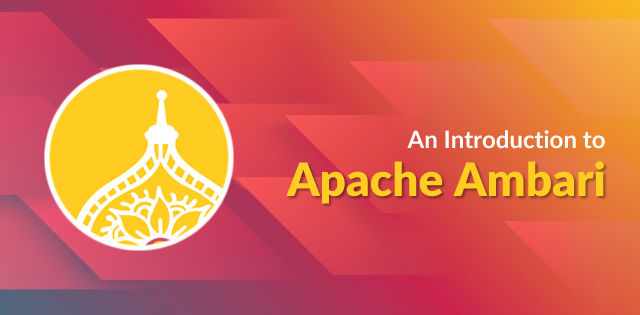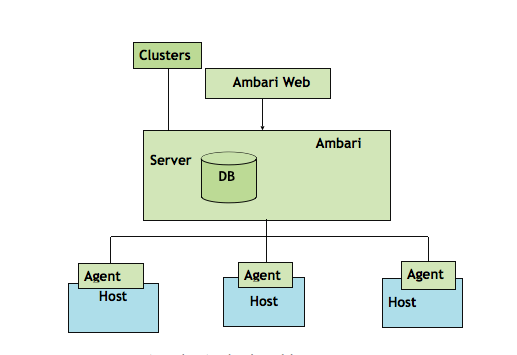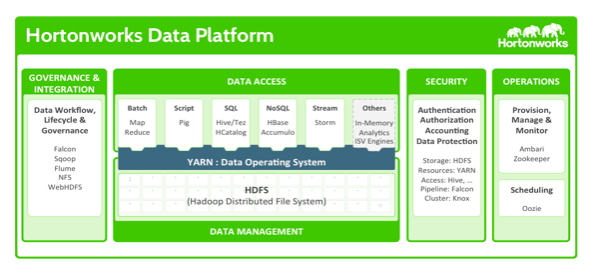Apache Ambari has impacted a broader portion of Apache Hadoop community. With the aim to make Hadoop projects simpler with portfolio management, provisioning, and monitoring it is the time to make an imperative call for Hadoop professionals to learn Apache Ambari along with Hadoop and other tools associated with Hadoop ecosystem.
Also Read: The best way to learn Hadoop for Beginners
Hence, in this blog, we will explain the basics of Apache Ambari that anyone must know to learn Apache Ambari as part of Hadoop administration.
Why is it Important to Learn Apache Ambari?
Apache Ambari is a project that targets to make management of Hadoop easier and simpler for the developers and administrators. Along with it, Ambari allows System Administrators to manage Hadoop clusters and ecosystem efficiently by developing required software for management, monitoring, and provision of Apache Hadoop clusters.
(Apache Ambari Framework)
Moreover, Apache Ambari offers an easy and simple to use web-based UI with RESTful APIs for Hadoop management. Engineers and administrators are now trying to get their hands on Apache Ambari due to the various advantages it offers.
Some of the reasons why you should aim to learn Apache Ambari are:
1. Administrative Management Capabilities
Apache Ambari provides excellent management abilities to the developers and administrators to efficiently manage the entire Hadoop ecosystem. Ambari provides the following services:
- Remove or add hosts to the cluster
- Add, remove, start, stop or restart the services
- Restarting the clusters or services after configuration changes
- Rollback, edit the service/components configurations
- Moving the nodes to different host
- Automation services and integration services offered by Ambari in the form of Ambari Blueprints, Ambari Stacks, and Ambari API
2. Simple to Use and Learn
The web interface of Ambari focuses on keeping it simple. With this easy interface, it becomes easy for you to learn Apache Ambari. Not to mention, the ultimate goal of Ambari is to provide an easier way to manage and monitor Hadoop ecosystem. Thus, Ambari APIs are made to perform the cluster automation without any user interaction. Single Ambari server is usually installed on the host and run on the host Ambari following the client-server architecture.
The server here acts as the single point of entry to the cluster that runs the web UI providing the RESTful APIs of Ambari. Along with it, by using Ambari, you can pick and choose the hosts you need the cluster use along with the services required to be installed.
3. Career Opportunities
The demand for professionals carrying Apache Ambari skills is increasing, and the hiring has also increased a lot in the last couple of years. There has been a significant growth (approximately 12%) in the average salary the Hadoop professionals with Ambari skills are receiving nowadays. This requirement will only increase in the coming years. Hence, there are huge career growth and progression opportunities in this field.
4. Lifecycle Management
Ambari follows Lifecycle Management format that allows it to manage the services in Hadoop ecosystem. So, the lifecycle commands like status, start, install, configure, and stop being used to work with the services and this gives the flexibility of configuration too.
New in the world of Big Data? Here is everything you should know to start career in Big Data as a fresher?
Steps for Apache Ambari Installation
Apache Ambari offers a complete monitoring and management application for Hadoop. A graphical user interface (GUI) helps in operating the Hadoop stack while managing the configuration changes. To learn Apache Ambari installation, you need to follow the below-mentioned step by step process.
1. Prepare to install:
- As the first step, determine the stack compatibility of Ambari versions with HDP stack versions. Ambari installation wizard needs a graphical browser as it runs as a browser-based application.
- Your browser must meet the requirements as per the operating system.
- There are certain softwares required on every host that include Oracle Linux or RHEL or CentOS along with SLES and Python.
- The installation needs Debian or Ubuntu too.
- Ambari supports specific JDKs (Java Development Kits) as part of the installation.
- Ambari also requires relational database like MySQL, Oracle, PostgreSQL MariaDB, etc.
2. Prepare the Environment:
This step includes the set up of Passwordless SSH and user accounts along with the configuration of NTP, DNA, iptables, and database connectors.
3. Prepare Local Repository:
- You need local repository for better performance and governance. This set up will include obtaining and setting up public repositories using limited or no internet access.
- Then it needs to prepare the Ambari Repository file (configuration) for using the new local repository. For further steps, include Ambari Repositories and HDP Stack Repositories.
4. Ambari Installation:
- This step will include the downloading of Ambari Repository followed by installation and set up of Ambari Server. This step includes the command line editor to perform the instructions for the installation of different operating systems like Linux 6/7, SLES 12/11, Ubuntu 14/16 and Debian 7.
- After this, you need to perform the installation of Ambari Server and its set up. This involves setting up of Ambari database, JDK installation and user account set up.
5. Management Packs:
- These packs allow us to deploy various services for your cluster.
- After installing the management packs, update the URL in Ambari and start the server.
- Next step is launching the Ambari installation wizard.
6. Install, Configure and Deploy the Cluster:
- Start the server and log in to Apache Ambari.
- Launch the Cluster installation wizard
- Provide a name to the cluster and select version.
- Test the clusters and complete the installation.
It is important to learn Apache Ambari for an Hadoop Administrator. Let’s have a look on the Hadoop Administrator Job Responsibilities!
Some Important Facts About Ambari Hortonworks
Apache Ambari is a part of Hortonworks data platform and is open source. It helps the enterprises to effectively plan and install HDP securely, making it easier for cluster maintenance and management. Furthermore, Ambari helps in making the Hadoop management easy and simple as it offers a consistent and secure platform.
It helps in the installation of clusters irrespective of the size of the cluster. An excellent web User Interface of Ambari along with the REST APIs helps in automating the operations of clusters.
Overall, Ambari Hortonworks help in the following:
-
Apache Ambari Installation, Management, and Configuration
Ambari allows taking the guesswork out of the configuration by the features Smart Configs. It becomes easy to create and monitor the clusters at a scale. Along with it, Ambari Blueprints allow the automatic and repeated creation of clusters.
-
Visibility to Keep a Check on the Health of Cluster
Hortonworks SmartSense along with Ambari helps in resolution and prevention of cluster issues. There is a holistic approach to follow for the cluster health with best practices. Also, it captures operational metrics and helps in visualizing using Grafana for troubleshooting purposes. Its predefined alerts for cluster monitoring allow full visibility.
(Image Source: https://2xbbhjxc6wk3v21p62t8n4d4-wpengine.netdna-ssl.com/
wp-content/uploads/2014/03/11.png)
-
Central Security
Apache Ambari Hortonworks helps in reducing the complexity of administration and configuration of cluster security at the platform. The set up gets automated across it. The configuration of advanced security abilities of clusters like Apache Ranger and Kerberos is also automated.
-
Customizable and Extensible
Ambari Hortonworks allows Hadoop to fit properly and efficiently in the environment of your enterprise. Ambari Views help in customizing the web UI of Ambari. At the same time, Ambari Stacks bring the custom services in the management of Hadoop, making it highly extensible.
A Hadoop certification adds more value to your Big Data Hadoop career. Here is the comprehensive list of the best Hadoop certifications in 2018.
What is Apache Ambari used for?
Before you begin to learn Apache Ambari, you must know properly what is its sole purpose? To explain, Apache Ambari is an intuitive way to manage Hadoop using web UI and providing different services to the System Administrators.
Ambari helps in managing complex and large distributed systems of Hadoop by simply accessing and managing it. Besides that, it supports all the major Hadoop components like Hive, Pig, MapReduce, HBase, HDFS, etc.
-
Provisioning of a Hadoop Cluster
Apache Ambari offers an excellent installation wizard. It is a step by step process for the Hadoop services. You can install these services for any number of hosts.
-
Monitoring of a Hadoop Cluster
Apache Ambari monitors the Hadoop cluster in a holistic way. It provides dashboard where you can monitor the status and health of Hadoop clusters effectively. Furthermore, Ambari metrics system collects the metrics to evaluate the clusters. Along with it, Ambari Alert Framework provides system alerts and notifies you. In this way, you get the alerts when attention is required.
-
Management of a Hadoop Cluster
Apache Ambari provides a central platform to manage the services of Hadoop in the clusters. Ambari handles start, stop, and configuration of the services across the clusters.
Ambari allows the system integrators and application developers to integrate the Hadoop management, monitoring capabilities, and provisioning of the clusters with Ambari REST APIs.
Bottom Line
Whizlabs is continually serving aspiring Hadoop community with the best level of training guides in hot technologies, and Hadoop is one of them. Our HDP Certified Administrator (HDPCA) Certification is a good opportunity to learn Apache Ambari along with Hadoop administration in Hortonworks platform. It will provide you with complete guidance from Apache Ambari installation to the use of Apache Ambari in Hadoop ecosystem.
Still thinking? Start learning Apache Ambari to become a Hadoop administrator!
Have any questions about Apache Ambari? Write below in the comment or just right here, we’ll be happy to answer!
- Top 45 Fresher Java Interview Questions - March 9, 2023
- 25 Free Practice Questions – GCP Certified Professional Cloud Architect - December 3, 2021
- 30 Free Questions – Google Cloud Certified Digital Leader Certification Exam - November 24, 2021
- 4 Types of Google Cloud Support Options for You - November 23, 2021
- APACHE STORM (2.2.0) – A Complete Guide - November 22, 2021
- Data Mining Vs Big Data – Find out the Best Differences - November 18, 2021
- Understanding MapReduce in Hadoop – Know how to get started - November 15, 2021
- What is Data Visualization? - October 22, 2021



